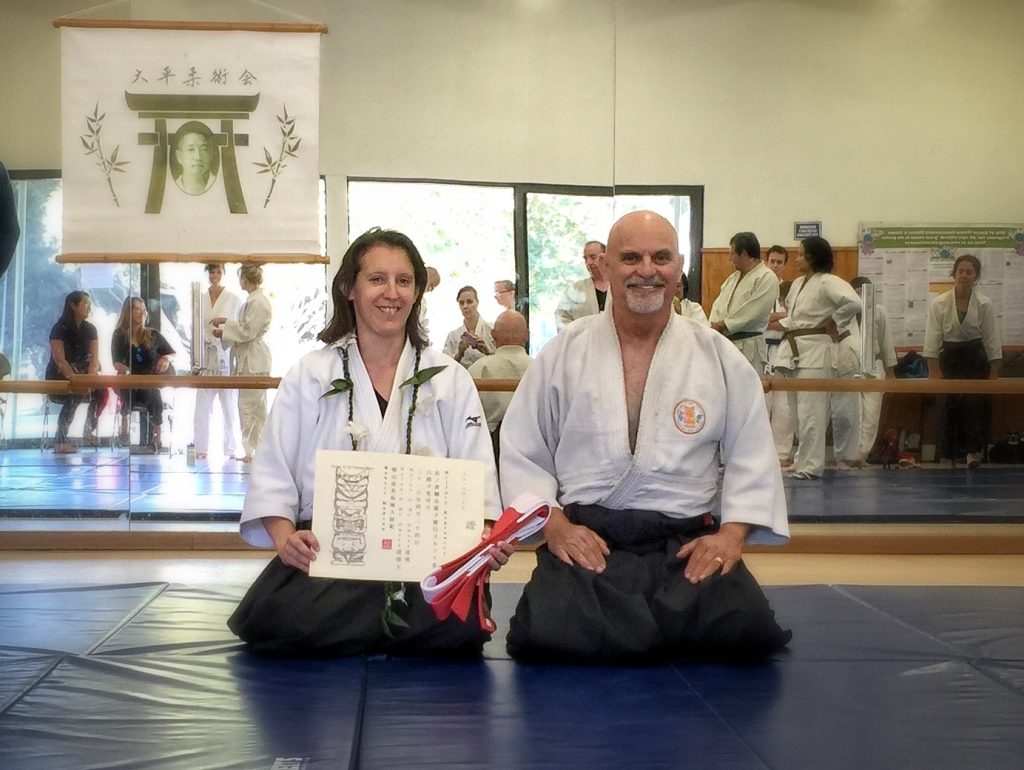Professor Okazaki named his dojo the Kodenkan, which translates as “Ancient Tradition School.” The significance of this name is that it means a school where the more advanced students teach the less advanced students. Okazaki described this spirit by using the Hawaiian word, Kokua, “to mutually help one another.”
Training in Danzan Ryu JuJitsu begins with basic warm-ups that include conditioning, flexibility and strengthening exercises. Okazaki formulated a list of these exercises called the Kowami. Beginning students will also learn Sutemi, the rolls and falls. These techniques will teach balance and coordination and allow students to be thrown safely.
The Danzan Ryu curriculum is broken down into different levels (see below). Each list of techniques (Yawara, Nage, Shime, etc.) is referred to as a board. In Okazaki’s dojo the lists were written on boards on the wall. In additional to the boards there are certain Kuden or orally transmitted materials that are necessary at each level.
Also on the wall in the Kodenkan were certain sayings that Okazaki felt were important. One was Bun Shikashite Bu which means the literary arts are just as important as the martial arts. Another was Sei Chu Do which means stillness amidst commotion.

Danzan Ryu consists of both martial and healing art techniques. Okazaki taught both to all of his students in order to balance their fighting spirit with their healing spirit. The phrase kappo or sappo, cure or kill, further illustrates this concept that one must be responsible for reversing the consequences of fighting with healing.
The healing side of Danzan Ryu is called seifukujitsu and is taught at Pacific JuJitsu Kai as part of the Danzan Ryu curriculum. The AJJF Danzan Ryu Sefiukujitsu Institute offers comprehensive courses in Seifukujitsu. Many Pacific JuJitsu Kai students are graduates of the DZRSI program and Prof Kaplowitz is an instructor in the program.
| Level | Rank | Belt Color | Basic Curriculum |
|---|---|---|---|
| Shoden Beginning Transmission | Rokyu Gokyu Yonkyu | White (6th Kyu) Blue (5th Kyu) Green (4th Kyu) | Yawara Nage Te Shime Te* |
| Chuden Middle Transmission | Sankyu Nikyu Ikkyu | Brown (3rd Kyu) Brown (2nd Kyu) Brown (1st Kyu) | Oku No Te Kiai No Maki Fujin Goshin No Maki** |
| Okuden Deep Transmission | Shodan Nidan Sandan | Black (1st Dan) Black (2nd Dan) Black (3rd Dan) | Shinnin No Maki Shinyo No Maki Kappo |
| Kuden Oral Transmission | Yodan Godan Rokudan Shichidan Hachidan Kudan Judan | Black & Red (4th Dan) Black & Red (5th Dan) Red & White (6th Dan) Red & White (7th Dan) Red & White (8th Dan) Red (9th Dan) Red (10th Dan) | Shingin No Maki |
** Substitute AJJF Goshin Jitsu